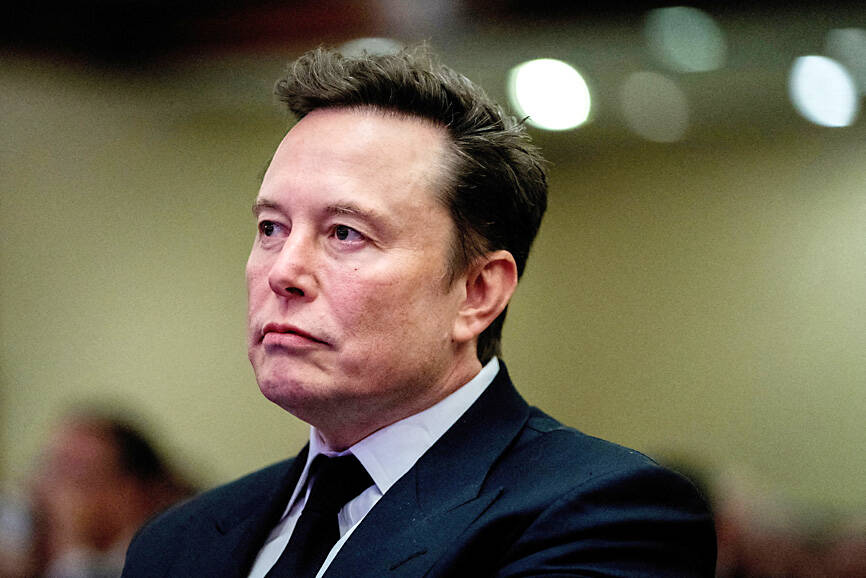A US judge on Monday upheld her decision to reject Elon Musk’s massive US$55.8 billion compensation package at Tesla Inc, denying an attempt to restore the pay deal through a shareholder vote.
In a court filing, Delaware Chancery Court Chief Judge Kathaleen McCormick ruled that Tesla’s attempt to ratify Musk’s compensation package through a June shareholder vote could not override her January decision striking down the package as excessive and unfair to shareholders.
McCormick found multiple flaws in Tesla’s ratification attempt, including “material misstatements” in documents provided to shareholders about the effect of their vote.

Photo: Reuters
“The motion to revise is denied,” McCormick wrote.
“The large and talented group of defense firms got creative with the ratification argument, but their unprecedented theories go against multiple strains of settled law,” she added.
In a statement on Musk’s X social media platform, Tesla said it would appeal the verdict.
“Shareholders should control company votes, not judges,” Musk said in a separate post.
The court also awarded US$345 million in attorney fees, significantly less than the US$5.6 billion requested by the lawyers of plaintiff Richard Tornetta, a Tesla shareholder.
While acknowledging their calculation method was technically sound under Delaware law, which bases fees on the percentage of benefit achieved, McCormick ruled that such a large award would constitute an excessive windfall.
Shareholders originally backed the Musk compensation plan in March 2018 that was specifically designed to reward the 53-year-old founder for Tesla’s significant growth. However, in a lawsuit, Tornetta accused the defendants of failing in their duties when they authorized the pay plan and alleged that Musk dictated his terms to directors, who were not sufficiently independent from their star CEO.
He also accused Musk of “unjustified enrichment” and asked for the annulment of a pay program that helped make the entrepreneur the richest man in the world.
During a trial in 2022, Musk countered that investors in Tesla were some of the “most sophisticated in the world” and able to keep tabs on his management.
Tesla had been the laughingstock of the auto industry, and it was only the massive success of the company’s Model 3 that turned things around, he said.
Musk insisted that he played no role in producing the package nor discussed his deal with the board members, some of them close friends, who signed off on it.
The Delaware Court of Chancery has been a pillar of US capitalism for more than a century and is the jurisdiction where about two-thirds of American Fortune 500 companies are registered.
Musk on Monday reposted other users’ X posts calling for companies to leave Delaware.

Meta Platforms Inc offered US$100 million bonuses to OpenAI employees in an unsuccessful bid to poach the ChatGPT maker’s talent and strengthen its own generative artificial intelligence (AI) teams, OpenAI CEO Sam Altman has said. Facebook’s parent company — a competitor of OpenAI — also offered “giant” annual salaries exceeding US$100 million to OpenAI staffers, Altman said in an interview on the Uncapped with Jack Altman podcast released on Tuesday. “It is crazy,” Sam Altman told his brother Jack in the interview. “I’m really happy that at least so far none of our best people have decided to take them

BYPASSING CHINA TARIFFS: In the first five months of this year, Foxconn sent US$4.4bn of iPhones to the US from India, compared with US$3.7bn in the whole of last year Nearly all the iPhones exported by Foxconn Technology Group (富士康科技集團) from India went to the US between March and last month, customs data showed, far above last year’s average of 50 percent and a clear sign of Apple Inc’s efforts to bypass high US tariffs imposed on China. The numbers, being reported by Reuters for the first time, show that Apple has realigned its India exports to almost exclusively serve the US market, when previously the devices were more widely distributed to nations including the Netherlands and the Czech Republic. During March to last month, Foxconn, known as Hon Hai Precision Industry

PLANS: MSI is also planning to upgrade its service center in the Netherlands Micro-Star International Co (MSI, 微星) yesterday said it plans to set up a server assembly line at its Poland service center this year at the earliest. The computer and peripherals manufacturer expects that the new server assembly line would shorten transportation times in shipments to European countries, a company spokesperson told the Taipei Times by telephone. MSI manufactures motherboards, graphics cards, notebook computers, servers, optical storage devices and communication devices. The company operates plants in Taiwan and China, and runs a global network of service centers. The company is also considering upgrading its service center in the Netherlands into a

Taiwan’s property market is entering a freeze, with mortgage activity across the nation’s six largest cities plummeting in the first quarter, H&B Realty Co (住商不動產) said yesterday, citing mounting pressure on housing demand amid tighter lending rules and regulatory curbs. Mortgage applications in Taipei, New Taipei City, Taoyuan, Taichung, Tainan and Kaohsiung totaled 28,078 from January to March, a sharp 36.3 percent decline from 44,082 in the same period last year, the nation’s largest real-estate brokerage by franchise said, citing data from the Joint Credit Information Center (JCIC, 聯徵中心). “The simultaneous decline across all six cities reflects just how drastically the market